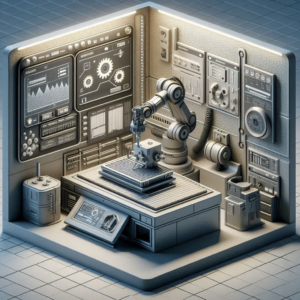
1. Introduction to AI-Driven Customized Manufacturing
The manufacturing landscape is undergoing a significant transformation, driven by the integration of artificial intelligence (AI) technologies. Traditional mass production methods are increasingly being replaced by customized manufacturing (CM) systems tailored to meet individual customer needs. This shift signifies a fundamental change in how products are designed, produced, and delivered. Customized manufacturing utilizes AI to enhance operational efficiency, improve product quality, and reduce time-to-market. By leveraging advanced technologies such as machine learning, the Internet of Things (IoT), and edge computing, manufacturers can create highly flexible production systems. This capability is essential in today’s dynamic market, particularly in the UAE, where consumer preferences are rapidly evolving.
2. Key Technologies in AI-Driven Customized Manufacturing
2.1 Cloud Native Application Development
Cloud native application development is essential for building scalable applications that support customized manufacturing processes. These applications utilize microservices and APIs to enhance flexibility and adaptation to changing market dynamics. Furthermore, adopting cloud native architectures enables seamless integration of vital manufacturing functionalities.
2.2 Cloud Infrastructure Management
An effective cloud infrastructure management strategy is critical for successful customization in manufacturing. This involves overseeing the deployment and maintenance of cloud resources that support manufacturing processes. By ensuring optimal cloud infrastructure management, manufacturers can enhance data accessibility and streamline workflows.
2.3 Hybrid Cloud Solutions
Hybrid cloud solutions play a pivotal role in AI-driven customized manufacturing. They allow manufacturers to combine on-premises resources with cloud-based solutions. This flexibility ensures that organizations can scale operations according to demand while maintaining data security and compliance.
2.4 Multi-Agent Systems (MAS)
Multi-agent systems (MAS) consist of autonomous agents that communicate and collaborate. In customized manufacturing, MAS can facilitate: Dynamic Resource Allocation: Agents can negotiate and allocate resources based on real-time production needs. Task Decomposition: Complex tasks can be broken down into smaller, manageable subtasks. Collaborative Problem Solving: Agents can work together to solve production challenges, enhancing overall resilience.
3. Implementation of AI-Driven Customized Manufacturing
The successful implementation of AI-driven customized manufacturing entails several key steps:
3.1 System Architecture
Establishing a robust system architecture is crucial for integrating AI technologies. This architecture typically consists of three layers: Device Layer: Includes physical manufacturing equipment, sensors, and IoT devices. Edge Computing Layer: Processes data locally, enabling real-time decision-making. Cloud Service Layer: Serves as a centralized repository for data storage.
3.2 Data Management
Effective data management is vital for the success of AI-driven manufacturing. Key aspects include: Data Integration: Combining data from various sources. Data Quality Assurance: Ensuring the accuracy and completeness of data. Data Security: Implementing measures to protect sensitive data.
3.3 Workforce Training
As AI technologies gain prevalence, investing in workforce training becomes essential. Employees must be equipped with the skills to work alongside AI systems. Training programs should cover: Technical Skills: Educating employees on advanced manufacturing technologies. Data Literacy: Teaching workers how to utilize data insights. Change Management: Guiding employees through transitions in technology adoption.
4. Challenges and Considerations
While the benefits of AI-driven customized manufacturing are substantial, several challenges need attention:
4.1 Integration Complexity
Integrating AI technologies into existing systems can be complex. Manufacturers must carefully plan their integration strategies.
4.2 Data Privacy and Security
The increased dependence on data raises significant concerns about privacy. Manufacturers must implement robust cybersecurity measures.
4.3 Skill Gaps
The rapid pace of technological advancement can lead to skill gaps within the workforce. Manufacturers need to prioritize training and development.
4.4 Cost Considerations
Implementing AI-driven solutions may require considerable upfront investment. Manufacturers must weigh potential returns against the costs.
5. Future Trends in AI-Driven Customized Manufacturing
The future of AI-driven customized manufacturing appears promising, with several trends poised to shape the industry:
5.1 Increased Personalization
As consumer preferences evolve, manufacturers will focus on delivering personalized products. AI technologies will enable rapid customization.
5.2 Enhanced Collaboration
The integration of AI and IoT will foster greater collaboration among manufacturers, suppliers, and customers.
5.3 Sustainability Initiatives
Manufacturers will prioritize sustainability in their operations, utilizing AI technologies to optimize resource utilization.
5.4 Advanced Robotics
The use of advanced robotics in manufacturing will continue to rise, enhancing productivity and efficiency across production lines.
6. Conclusion
For more information on how Cloudastra Technologies can help with your software service needs, please visit our website for business inquiries.
Do you like to read more educational content? Read our blogs at Cloudastra Technologies or contact us for business enquiry at Cloudastra Contact Us.